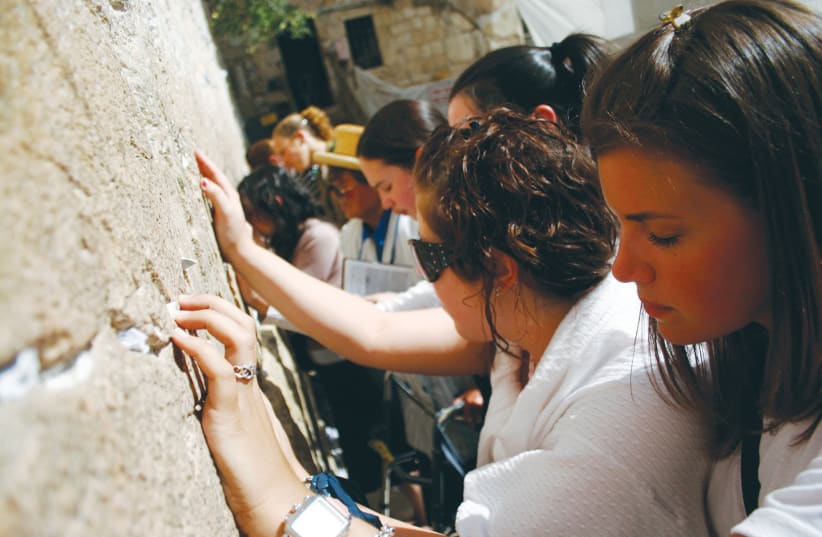As Jewish teenagers, we always assumed that our fellow Jews had similar worldviews and adolescent experiences. However, when we began studying at the Shalom Hartman Institute for a post-high school gap year this fall, we quickly realized that while we share many similarities, differences still exist between Israeli and American teenagers.
We are three 18-year-old students, two Americans and one Israeli, studying at Hevruta, a program that brings together 67 teenagers – half of whom Israeli and the other half American – to study Judaism, philosophy, and geopolitics for nine months in Jerusalem. When our year ends, our lives will diverge dramatically: the Americans will attend university and the Israelis will serve in the IDF.
The Israelis among us have been raised in the shadow of the Second Intifada, in a society that has largely given up on Palestinians as peace partners; they listen to solemn music on Remembrance Day and know that they, like their neighbors before them, will serve in the IDF. American teenagers do not face the same pressures.
While American Jewish youth care about Israel, they are not the ones standing on the field in Hebron, they are not wearing identical green army uniforms waiting for a bus to carry them miles away from their families, they are not confronted with ethical dilemmas daily, making split-second decisions about who lives and dies. Israelis stand up and protect their fellow citizens. Meanwhile, American Jewish teenagers have the privilege of being able to support Israel comfortably from afar, just in case – and if we choose.
Understandably, Israeli youth have misconceptions about American life. Many Israelis believe the insidious stereotype of the “rich uncle from America,” an inordinately wealthy, flashy and obnoxious caricature of American culture. To Israelis, American teens embody the characteristics of this rich uncle: they live posh lives, laugh in wood-paneled college dining halls, play baseball with their friends after class and study what they please, if they study at all. These images are further fueled by an American media that displays American adolescence as a blissful experience, filled with prom limousines and dramatic background music. There is some truth to these portrayals, but stereotyping and judging doe not reflect reality.
Israelis observe these differences and often feel compelled to defend their history and politics even more to Americans. It is natural that Israelis, who are dedicating a portion of their lives to defending a Jewish state, want Americans to acknowledge their sacrifice and heroism. It threatens Israelis’ sense of self to hear Americans, many of whom they view as over privileged, criticize Israel.
The relationship between Americans and Israelis is multifaceted, and there is no quick fix. However, based on our experience living and studying together, we offer a few suggestions:
For one, both parties must seek mutual understanding.
American adolescents must appreciate the dedication of their Israeli peers in sustaining a Jewish homeland. Additionally, many American Jewish teenagers want to discuss Israeli politics, and their opinions should be welcomed. However, Americans must also recognize that their suggestions don’t have the same, potentially harmful, impact on their daily lives. Therefore, Americans should approach Israeli political issues with humility, acknowledging that they will not be the ones directly paying the price for their opinions.
Alternatively, Israeli youth should respect their American counterparts as valuable allies, thinkers and partners, while also understanding that American Jews feel connected to two different historical narratives. On one hand, many are the children of Ellis Island immigrants, their grandparents’ heads popping up from rickety boats to see the momentous, welcoming Statue of Liberty. However, they are also the symbolic descendants of the First Zionist Congress, their relatives dreaming of a homeland in the Middle East, a refuge from antisemitism.
Secondly, harmful stereotypes of both cultures must be debunked. One way to break stereotypes is by cross-cultural connections. For example, after just a week of spending time together, one Israeli exclaimed: “You guys actually study a lot in American schools!” This anecdote is symbolic of a larger change occurring in our program as we have gotten to know each other better: the active refusal of surface-level misconceptions that initially separated us. We became more than our national identities and stereotypical attributes by reverting to our truest form: teenagers. Teenagers who laugh, share turkey during Thanksgiving and dance to Eurovision music together.
However, programs like ours that merge both cultures are rare and sometimes extremely selective. For example, in Israel, a prestigious Jewish Agency program places accomplished Israeli teenagers as volunteers in American cities. Thousands of Israeli teenagers apply to this program yearly but only a handful are accepted. Ideally, more affordable and accessible programs like this should be established to build cultural understanding.
Ultimately, every additional day we spend together and bond more, we discover even more why our relationship matters. It matters because through getting to know each other, we have stepped outside our comfort zones and societal bubbles. It matters because we discovered that our shared religion may not equate to a shared lifestyle.It matters because despite our differing approaches to government, healthcare and education, we still have the potential to become close friends. It matters because the American and Israeli Jewish teenager’s experiences – like the Statue of Liberty and Western Wall, are different, yet related. While the Statue of Liberty and Western Wall may have been built with different materials, both are beacons of hope – to us, to Jews worldwide and to humanity.
Margot Amouyal, 18, is from Boston. Rebecca Weiss, 18, is from Washington, DC. Amir Pagis, 18, is from Jerusalem. All three are participants in Hevruta, the Shalom Hartman Institute’s gap year program in Jerusalem.
